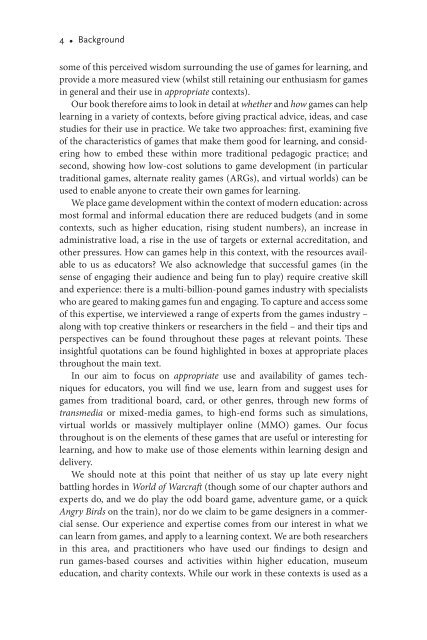9781136341311_sample_498603
9781136341311_sample_498603
9781136341311_sample_498603
Create successful ePaper yourself
Turn your PDF publications into a flip-book with our unique Google optimized e-Paper software.
4 • Background<br />
some of this perceived wisdom surrounding the use of games for learning, and<br />
provide a more measured view (whilst still retaining our enthusiasm for games<br />
in general and their use in appropriate contexts).<br />
Our book therefore aims to look in detail at whether and how games can help<br />
learning in a variety of contexts, before giving practical advice, ideas, and case<br />
studies for their use in practice. We take two approaches: first, examining five<br />
of the characteristics of games that make them good for learning, and considering<br />
how to embed these within more traditional pedagogic practice; and<br />
second, showing how low-cost solutions to game development (in particular<br />
traditional games, alternate reality games (ARGs), and virtual worlds) can be<br />
used to enable anyone to create their own games for learning.<br />
We place game development within the context of modern education: across<br />
most formal and informal education there are reduced budgets (and in some<br />
contexts, such as higher education, rising student numbers), an increase in<br />
administrative load, a rise in the use of targets or external accreditation, and<br />
other pressures. How can games help in this context, with the resources available<br />
to us as educators? We also acknowledge that successful games (in the<br />
sense of engaging their audience and being fun to play) require creative skill<br />
and experience: there is a multi-billion-pound games industry with specialists<br />
who are geared to making games fun and engaging. To capture and access some<br />
of this expertise, we interviewed a range of experts from the games industry –<br />
along with top creative thinkers or researchers in the field – and their tips and<br />
perspectives can be found throughout these pages at relevant points. These<br />
insightful quotations can be found highlighted in boxes at appropriate places<br />
throughout the main text.<br />
In our aim to focus on appropriate use and availability of games techniques<br />
for educators, you will find we use, learn from and suggest uses for<br />
games from traditional board, card, or other genres, through new forms of<br />
transmedia or mixed-media games, to high-end forms such as simulations,<br />
virtual worlds or massively multiplayer online (MMO) games. Our focus<br />
throughout is on the elements of these games that are useful or interesting for<br />
learning, and how to make use of those elements within learning design and<br />
delivery.<br />
We should note at this point that neither of us stay up late every night<br />
battling hordes in World of Warcraft (though some of our chapter authors and<br />
experts do, and we do play the odd board game, adventure game, or a quick<br />
Angry Birds on the train), nor do we claim to be game designers in a commercial<br />
sense. Our experience and expertise comes from our interest in what we<br />
can learn from games, and apply to a learning context. We are both researchers<br />
in this area, and practitioners who have used our findings to design and<br />
run games-based courses and activities within higher education, museum<br />
education, and charity contexts. While our work in these contexts is used as a


